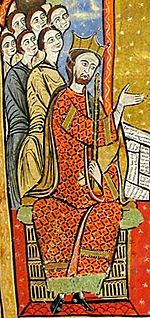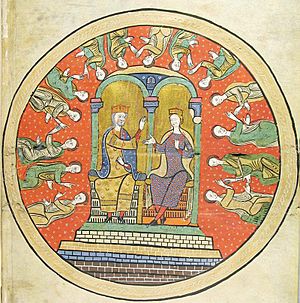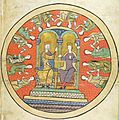Alfonso II of Aragon facts for kids
Quick facts for kids Alfonso the Chaste |
|
|---|---|

Portrait from the 12th-century manuscript Liber feudorum maior
|
|
| King of Aragon Count of Barcelona |
|
| Reign | 18 July 1164 – 25 April 1196 |
| Predecessor | Petronilla |
| Successor | Peter II |
| Regent | Petronilla (until 1173) |
| Born | 1–25 March 1157 Huesca, Kingdom of Aragon |
| Died | 25 April 1196 (aged 39) Perpignan, Principality of Catalonia |
| Burial | Poblet Monastery |
| Spouse | |
| Issue among others... |
|
| House | Barcelona |
| Father | Ramon Berenguer IV, Count of Barcelona |
| Mother | Petronilla, Queen of Aragon |
Alfonso II (born between March 1 and 25, 1157 – died April 25, 1196) was a very important ruler in medieval Spain. He was known as the Chaste or the Troubadour. From 1164 until his death, he was the King of Aragon and also the Count of Barcelona.
Alfonso was the oldest son of Count Ramon Berenguer IV of Barcelona and Queen Petronilla of Aragon. He was the first person to be both the King of Aragon and the Count of Barcelona at the same time. This was a big deal because it united two powerful regions. He also ruled Provence for a while, from 1166 to 1173, before giving it to his brother. Historians sometimes call his time as ruler "the Pyrenean unity." This means he worked to bring together different lands on both sides of the Pyrenees mountains under his family's rule.
Contents
Becoming King
Alfonso was born in Huesca. When he became ruler, he chose the name Alfonso to honor an earlier Aragonese king, Alfonso the Battler. This showed respect for the traditions of Aragon.
Alfonso's Reign and Alliances
For most of his time as king, Alfonso II was good friends with Alfonso VIII of Castile, another powerful king. They often worked together against the Kingdom of Navarre and against the Moorish rulers in the south of Spain.
Alfonso II was part of the Reconquista, which was the effort to take back lands from the Moors. He expanded his kingdom by conquering important cities like Teruel in 1171. He also captured Caspe in the same year.
To make their alliance stronger, Alfonso II married Sancha of Castile, who was the sister of the Castilian king. This wedding happened in Zaragoza on January 18, 1174.
Another important agreement was the Treaty of Cazorla in 1179. This treaty helped the kings of Aragon and Castile decide which areas each kingdom would try to conquer in the south. This agreement helped Aragon gain control of southern parts of Valencia, including Denia. Alfonso also made a deal with the King of Navarre, called the Treaty of Sangüesa (1168), to divide the territory of Taifa of Murcia between them.
Expanding Influence
During Alfonso's rule, Aragon's power grew a lot, especially north of the Pyrenees mountains. This was natural because the people in these areas, like Occitan, Catalan, and Aragonese, were culturally similar. His kingdom grew to include Provence (around 1166), and the counties of Cerdanya (1168) and Roussillon (1172). Other regions like Béarn and Bigorre also showed their loyalty to him in 1187.
Alfonso's involvement in the region of Languedoc was very helpful for Aragon. It made trade stronger and encouraged people from the north to move and settle in the newly conquered lands in Aragon.
Supporting Monasteries
Alfonso II was a big supporter of religious groups. He gave land to the Cistercian monks near the Ebro River in Aragon. This land became the site of the first Cistercian monastery in that region.
The Monasterio de Piedra was founded in 1194 with thirteen monks. The Real Monasterio de Nuestra Senora de Rueda was founded in 1202. This monastery used some of the first water technology in the area. They used water power and river diversions to help with things like central heating. Alfonso also supported the Carthusians and helped start the first chapterhouse of Scala Dei in 1196.
Alfonso II died in Perpignan in 1196.
A King Who Wrote Poetry
Alfonso II was not just a king; he was also a well-known poet of his time. He was a close friend of King Richard the Lionheart. Alfonso even wrote a type of poem called a tensó with another poet, Giraut de Bornelh. This poem was part of a debate about whether a lady was dishonored if she took a lover who was richer than her.
Many other poets, called troubadours, mentioned Alfonso in their poems. For example, Peire Vidal praised Alfonso for choosing to marry Sancha of Castile instead of another princess.

Alfonso's Family
Alfonso married Sancha of Castile, who was the daughter of King Alfonso VII of Castile. They had several children:
- Peter II (1174/76 – 1213), who became King of Aragon after his father.
- Constance (1179 – 1222), who married two kings.
- Alfonso II (1180 – 1209), who became the Count of Provence.
- Eleanor (1182 – 1226), who married Raymond VI of Toulouse.
- Ramon Berenguer (around 1183/85 – died young).
- Sancha (1186 – after 1241), who married Raymond VII of Toulouse.
- Ferdinand (1190 – 1249), who became a monk.
- Dulcia (1192 – ?), who became a nun.
Images for kids
-
Alfonso II of Aragon and his wife Sancha, surrounded by the women of court. From the Liber feudorum maior.
See also
 In Spanish: Alfonso II de Aragón para niños
In Spanish: Alfonso II de Aragón para niños
 | Madam C. J. Walker |
 | Janet Emerson Bashen |
 | Annie Turnbo Malone |
 | Maggie L. Walker |


